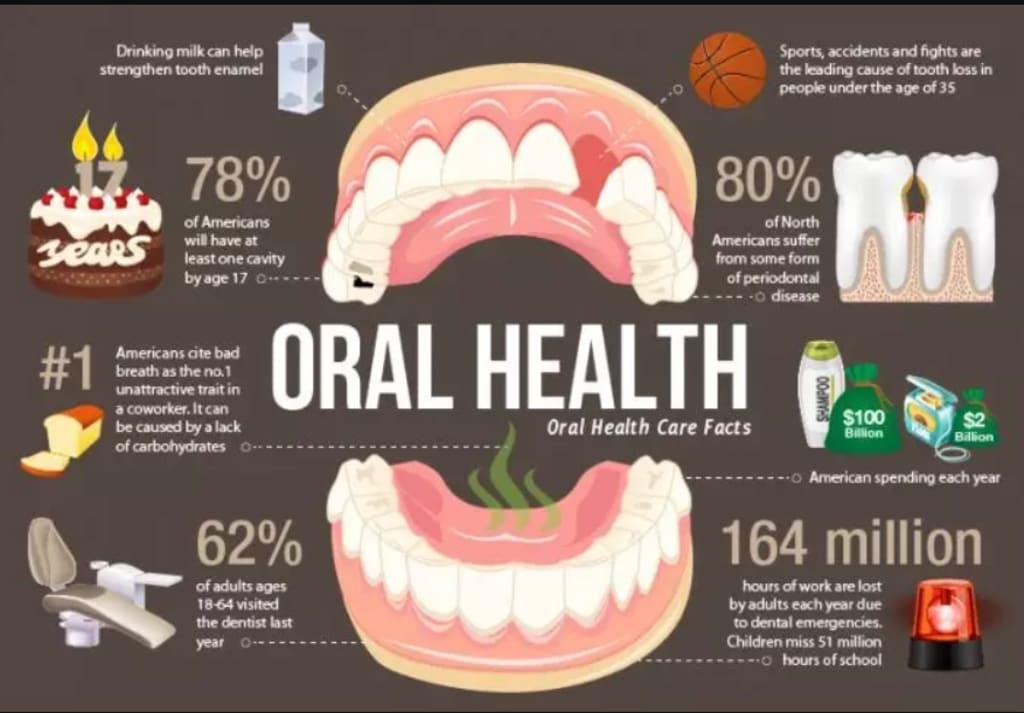What is the relationship between oral health and personal hygiene?
What is the difference between oral hygiene and dental hygiene?

## The Crucial Link Between Oral Health and Personal Hygiene
Personal hygiene is a cornerstone of overall well-being, encompassing a range of practices aimed at maintaining cleanliness and health. Among these, oral hygiene often stands out not only for its impact on our smiles but also for its profound connection to our general health. Understanding the relationship between oral health and personal hygiene is essential for appreciating how our daily habits contribute to a healthier, happier life.
### Why Oral Health Matters
Oral health is more than just having a bright smile or fresh breath; it plays a vital role in our overall health. The mouth is a gateway to the body, and poor oral hygiene can lead to several serious health issues, including:
1. **Tooth Decay and Gum Disease**: The most immediate consequences of neglecting oral hygiene are cavities and periodontal (gum) disease. Plaque, a sticky film of bacteria, builds up on the teeth and gums. If not removed through regular brushing and flossing, it can cause decay and inflammation.
2. **Systemic Health Issues**: Research shows a strong link between oral health and systemic conditions like heart disease, diabetes, and respiratory infections. Inflammation and bacteria in the mouth can enter the bloodstream, leading to or exacerbating these health problems.
3. **Impact on Digestive Health**: Effective chewing and saliva production are essential for digestion. Poor oral health can impair these functions, leading to digestive issues and malnutrition.
4. **Self-Esteem and Mental Health**: Oral health significantly affects our social interactions and self-confidence. Problems like bad breath, visible decay, or missing teeth can lead to embarrassment, social withdrawal, and even depression.
### Personal Hygiene: The Broader Context
Personal hygiene encompasses practices that maintain and promote cleanliness and health, such as bathing, hand washing, and grooming. These habits are fundamental in preventing illness and maintaining a sense of well-being. Here's how personal hygiene practices intersect with oral health:
1. **Daily Routines**: Personal hygiene routines typically include brushing and flossing teeth, alongside activities like showering and washing hands. Incorporating oral hygiene into your daily habits ensures that it becomes a seamless part of your overall health maintenance.
2. **Diet and Nutrition**: A healthy diet supports both personal and oral hygiene. Foods rich in vitamins and minerals promote healthy gums and teeth, while reducing sugar intake lowers the risk of tooth decay and general health issues like obesity and diabetes.
3. **Regular Health Check-ups**: Just as regular visits to the doctor are crucial for monitoring and maintaining overall health, routine dental check-ups are essential for preventing and addressing oral health issues before they become serious.
4. **Psychological Well-being**: Personal hygiene, including good oral care, enhances self-esteem and confidence. Feeling clean and healthy boosts our mood and encourages positive interactions with others.
### The Synergy Between Oral Health and Personal Hygiene
Oral health and personal hygiene are interconnected in a way that each supports and enhances the other. For example:
- **Prevention of Disease**: Regular brushing, flossing, and dental visits prevent oral diseases that can have systemic impacts. Similarly, good personal hygiene practices reduce the risk of infections and illnesses.
- **Promoting Healthy Habits**: Committing to oral hygiene encourages the development of other healthy personal hygiene habits. It's a holistic approach that benefits your entire body.
- **Social and Emotional Benefits**: Good personal hygiene, including oral care, can improve your social life and emotional well-being. A clean, healthy appearance boosts confidence and helps in forming and maintaining relationships.
### Practical Tips for Integrating Oral Health into Personal Hygiene
1. **Establish a Routine**: Make brushing and flossing a consistent part of your daily routine, ideally twice a day. Using fluoride toothpaste and a soft-bristled toothbrush can help protect your teeth and gums.
2. **Mind Your Diet**: Limit sugary snacks and drinks, and include plenty of water, fruits, vegetables, and dairy products in your diet to support both oral and overall health.
3. **Visit the Dentist Regularly**: Regular dental check-ups and cleanings are crucial for maintaining oral health and catching potential issues early.
4. **Practice Comprehensive Hygiene**: Incorporate oral care into your broader personal hygiene routine. This might include cleaning your tongue, using mouthwash, and ensuring you have clean hands when touching your mouth or eating.
5. **Stay Educated and Informed**: Keep yourself updated with the latest recommendations for both personal and oral hygiene. Understanding the reasons behind these practices can motivate you to maintain them diligently.
### Conclusion
Oral health and personal hygiene are deeply intertwined aspects of overall well-being. By integrating good oral care into your daily personal hygiene routine, you not only protect your mouth but also contribute to your general health, social confidence, and emotional balance. Remember, a commitment to oral health is a commitment to your overall quality of life.
## Understanding the Difference Between Oral Hygiene and Dental Hygiene
When it comes to maintaining a healthy smile and preventing dental problems, the terms "oral hygiene" and "dental hygiene" often come up. While they might seem interchangeable, there are subtle differences between the two. Let’s explore what each term encompasses and why understanding their distinction can help you better manage your oral health.
### Defining Oral Hygiene
Oral hygiene refers to the practices and habits that keep the entire mouth clean and healthy. This includes not only the teeth and gums but also other parts of the mouth, such as the tongue and the inside of the cheeks.
**Key Components of Oral Hygiene:**
1. **Brushing**: Regular brushing removes food particles and plaque from the surfaces of your teeth and gums. Using fluoride toothpaste helps strengthen tooth enamel and prevent decay.
2. **Flossing**: Flossing removes debris and plaque from between the teeth and below the gum line, areas that a toothbrush can’t reach effectively.
3. **Mouthwash**: Antimicrobial mouthwash can help reduce bacteria in the mouth, freshen breath, and reach areas that brushing and flossing might miss.
4. **Tongue Cleaning**: Using a tongue scraper or brushing your tongue helps reduce bacteria that can cause bad breath and contribute to oral health issues.
5. **Dietary Habits**: Consuming a balanced diet and limiting sugary foods and beverages are crucial for preventing tooth decay and gum disease.
### Defining Dental Hygiene
Dental hygiene, on the other hand, focuses more specifically on the health and cleanliness of the teeth and gums. While it overlaps significantly with oral hygiene, dental hygiene often involves professional care and treatments provided by dental professionals.
**Key Components of Dental Hygiene:**
1. **Professional Cleanings**: Regular visits to the dentist or dental hygienist for professional cleanings help remove tartar (hardened plaque) that can’t be removed by brushing and flossing alone.
2. **Check-ups and X-rays**: Routine dental check-ups and X-rays help detect and address issues like cavities, gum disease, and other dental problems early on.
3. **Preventive Treatments**: These include fluoride treatments, sealants, and other procedures that help protect teeth from decay and disease.
4. **Patient Education**: Dental hygienists and dentists provide valuable education on how to maintain proper brushing and flossing techniques, dietary advice, and tips for caring for dental restorations like fillings or braces.
### Comparing Oral Hygiene and Dental Hygiene
While oral hygiene and dental hygiene are closely related, their differences lie in their scope and the level of care involved:
1. **Scope of Care**:
- **Oral Hygiene**: Broadly encompasses all aspects of maintaining a healthy mouth, including teeth, gums, tongue, and breath.
- **Dental Hygiene**: Specifically focuses on the health and cleanliness of the teeth and gums, often with an emphasis on professional care.
2. **Daily Practices vs. Professional Care**:
- **Oral Hygiene**: Involves daily self-care practices like brushing, flossing, and using mouthwash.
- **Dental Hygiene**: Includes regular professional cleanings and check-ups in addition to home care routines.
3. **Preventive Focus**:
- **Oral Hygiene**: Aims to prevent a wide range of oral health issues, including bad breath and mouth infections.
- **Dental Hygiene**: Primarily targets preventing and managing tooth and gum diseases through both home care and professional interventions.
4. **Educational Aspect**:
- **Oral Hygiene**: Often self-taught or learned from general advice and recommendations.
- **Dental Hygiene**: Involves guidance and education from dental professionals to ensure optimal oral care.
### Why Understanding the Difference Matters
Understanding the distinction between oral hygiene and dental hygiene is crucial for comprehensive oral health care. Here’s why:
1. **Holistic Health Approach**: Emphasizing both aspects ensures that you’re not only maintaining clean teeth and gums but also caring for your entire mouth and overall health.
2. **Effective Preventive Care**: Combining good oral hygiene practices at home with regular professional dental care maximizes your efforts to prevent tooth decay, gum disease, and other oral health issues.
3. **Informed Decisions**: Knowing the roles of oral and dental hygiene helps you make informed decisions about your daily care routines and the importance of regular dental visits.
4. **Enhanced Quality of Life**: Good oral and dental hygiene contribute to better overall health, improved self-confidence, and a higher quality of life.
### Tips for Integrating Both into Your Routine
1. **Daily Brushing and Flossing**: Brush at least twice a day and floss daily to keep your teeth and gums clean and healthy.
2. **Use Mouthwash**: Incorporate an antimicrobial or fluoride mouthwash into your routine to enhance oral cleanliness.
3. **Regular Dental Visits**: Schedule professional cleanings and check-ups at least twice a year to maintain optimal dental hygiene.
4. **Stay Educated**: Seek advice from your dentist or hygienist on how to improve your oral and dental care practices.
5. **Healthy Lifestyle Choices**: Maintain a balanced diet, avoid tobacco, and limit sugary snacks to support both oral and dental health.Dentitox Pro Reviews
### Conclusion
Oral hygiene and dental hygiene, though distinct, are complementary components of comprehensive oral care. By understanding and integrating both into your daily routine, you can achieve a healthy mouth and a brighter smile. Remember, a proactive approach to oral and dental hygiene is your best defense against a range of health issues and a step towards a better, healthier life.
About the Creator
peter
Content about cars, motorbikes, technology, news
Enjoyed the story? Support the Creator.
Subscribe for free to receive all their stories in your feed.






Comments
There are no comments for this story
Be the first to respond and start the conversation.